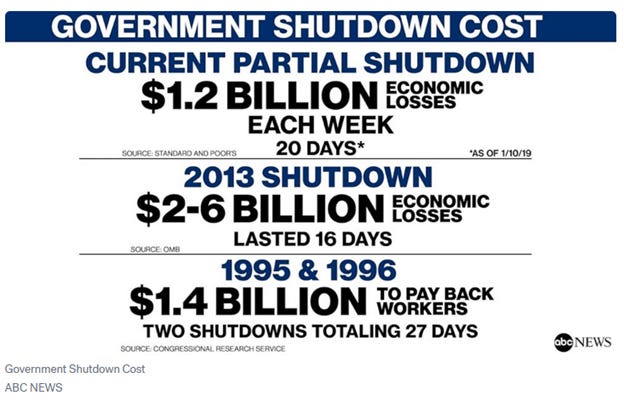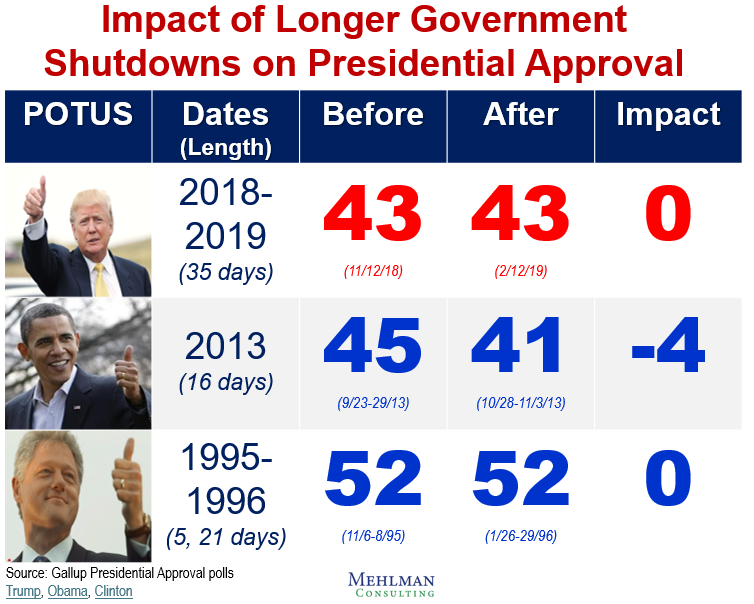Six-Chart Sunday (#56) – Shutdown Countdown
6 Infographics + 1 Video (Karl Rove on McKinley, Trump & the New/Old Politics of Populism)
Beware the Ides of March. Absent a bipartisan funding deal that seems increasingly unlikely, the federal government "shuts down" March 15th. Any spending bill will need to find common ground among factions that fundamentally don’t agree: Fiscal Hawks, Defense Hawks, Border Hawks, Progressives, anti-DOGE Democrats (aka Democrats), representatives of states needing disaster relief and the White House. And this time may be very different, as the Trump Administration may even welcome a shutdown as a chance to accelerate its efforts to transform government. Six charts on shutdowns, past and potential.
Why a Shutdown Seems Likely: Government funding legislation (and increasing the debt ceiling) requires 60 votes in the Senate (aka bipartisanship). This usually forces bipartisanship in the House as well since some House conservatives reject bipartisan Senate deals and/or never vote to increase the debt ceiling. Republicans are presently divided over how much spending to cut, whether and how to offset extending/expanding tax cuts & whether to waive the debt ceiling for 4 years. Democrats struggle over how to cut a spending deal that the White House/DOGE can’t just ignore by refusing to spend funds… and whether allowing a shutdown might play into GOP/DOGE hands, encouraging wider firings. Something’s gotta give.
Shutdowns Since 1976. This would be the 22nd government shutdown since 1976, and potentially one of the longest (given likely litigation and potentially less pain for essential workers — see #3 below).
Why This Time May Be Different. Since 1980, shutdowns have led to large percentages of federal employees being furloughed (aka “non-essential workers”) or required to work without pay pending a deal (“essential workers” such as the military). Chart below shows historically who got furloughed. But prior to 1980 agencies didn’t shut down absent funding. In 1980, President Carter’s attorney general interpreted the 1870 Anti-Deficiency Act to require the sort of shutdown with which we’ve all become familiar. Many suspect the Trump Administration may disagree with that 45 year-old legal opinion, continuing to pay soldiers and other essential workers (removing some pressure to make a deal and daring Democrats to sue to block pay to the military). As with debate over the President’s ability to “impound” spending, litigation will ensue swiftly.
Shutdowns & the Economy. Analysts have found government shutdowns are a drag on economic growth, though much depends on the scope & length of each shutdown.
Shutdowns and Markets. Notwithstanding the economic losses detailed above, “history shows that the financial and economic impact tends to be very short lived” (though markets sometimes react more negatively to debt ceiling brinkmanship). Chart below looks at market impacts (Strategas):
Shutdowns and Politics. While polling overwhelmingly shows the public disapproves of shutdowns and believes they hurt the economy, there is little evidence of short-or-long-lasting negative political impact on Presidential Administrations. In fact, President Clinton may have benefited from his face-off with Speaker Gingrich & the House GOP, who were seen as the instigator of the standoff (and lost 4 seats 11 months later when Clinton won 379 electoral college votes). (Below Gallup Presidential approval polls for Trump, Obama, Clinton).
VIDEO
Talk of the 25th President is everywhere right now. President Trump praised William McKinley in his second inaugural as a "great President," and the Economist, Washington Post, Cincinnati Enquirer & New York Times all recently wrote about the two Presidents’ similarities and differences.
Karl Rove literally wrote the book on McKinley! His passion and enthusiasm came through in this week’s discussion… Karl is the history professor you always wanted!








Yet another great interview by Bruce with Karl Rove. I learned a lot about McKinnley and others which is so relevant to today.
A great interview with Rove! History matters. This interview shows in substance... Thank you for making it available.